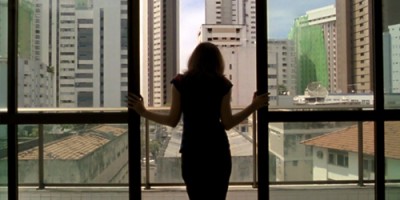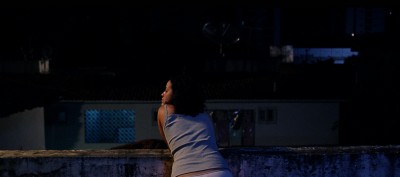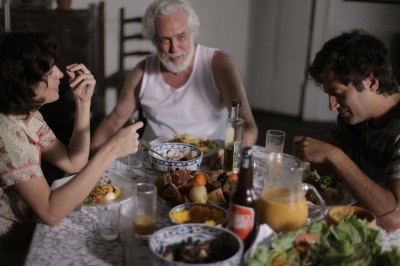| Reviews & Columns |
|
Reviews DVD TV on DVD Blu-ray 4K UHD International DVDs In Theaters Reviews by Studio Video Games Features Collector Series DVDs Easter Egg Database Interviews DVD Talk Radio Feature Articles Columns Anime Talk DVD Savant Horror DVDs The M.O.D. Squad Art House HD Talk Silent DVD
|
DVD Talk Forum |
|
|
| Resources |
|
DVD Price Search Customer Service #'s RCE Info Links |
|
Columns
|
|
|
Neighboring Sounds

Please Note: The images used here are stills provided by Cinema Guild and are not taken from the current Blu-ray edition under review.
"This place isn't haunted," says a young man, João (Gustavo John), to a potential condo buyer at one point in Brazilian writer/director Kleber Mendonça Filho's vital, indelible debut feature-length picture, Neighboring Sounds. João is putting his client's mind at ease because of a suicide she's heard tell of in this high-rise residential building , owned by João's affluent family, in the gentrifying northeastern Brazilian seaside town of Recife. But this immaculately modern new tower block of luxury flats with gorgeous views from on high is haunted in several ways, and that's what Filho's film, which has its finger on the pulses of several lucky residents of this up-and-coming street in one of the city's newly prosperous new-construction areas, takes as its rich theme. The film's supple, expansive, mysterious but transfixing movements gradually reveal the different kinds of ghosts from bygone times -- whether in the form of living, silent figures on the margins or actual magical-realist phantoms and apparitions -- can haunt a person, a place, or even a nation, no matter how oblivious or conveniently forgetful one is of the past, or how shiny and new a surface one overlays, like trying to wallpaper a shadow, atop troubled, unresolved history.

One such ghost is João's new lady friend, Sofia (Irma Brown), whose victimization at the hands of the neighborhood's dirty-secret car-stereo thieves the first time she comes home for the night with her new boyfriend, is the catalyst for what could be considered the central event of the film (which is divided into three significantly titled parts: "Guard Dogs," "Night Guards," and "Bodyguards"), the arrival of a small band of private professional guards that sells its patrol services to the newly crime- and security-conscious neighborhood, but about whose actual origins and purposes its black-vested members -- foremost among whom is Clodoaldo (Irandhir Santos) -- remain eerily tight-lipped. We infer that Sofia's family, when she was a child, was priced out of their humble dwelling in this very neighborhood when João's grandfather, the calmly, seemingly benevolently in-charge Francisco (W.J. Solha), a sugar-plantation baron, bought it up and began upscaling it through development, effectively banishing the scraggly lowball renters. Francisco sits atop the empire of high-rises he's built as a sort of benignly influential kingpin, which, in light of Sofia's returning-exile status, makes her and João's visit to the old plantation, where Francisco dotes on what he hopes will be their impending marriage, a haunted affair unto itself. It's difficult to say whether Francisco or the outwardly friendly but tough-looking new security forces have more in their past to haunt them (or one another), but suffice it to say that they're connected, and the film's concluding implications about their relationship renders eye-openingly resonant the evocative, unexplained still-photo montage of pictures of rough, hierarchical, and exploitative sugar plantation life with which Filho opens the film.

Meanwhile, an undergirding assemblage of darker- or black-skinned maids -- João's maternal longtime family maid Maria (Mauricéa Conceição); the building's aged, "lazy" super, whom the homeowner's association meets and conspires to get rid of; and Francisco's Luciene (Clebin Sousa), possessed of a beautiful but doomed to be wasted youth -- is the neighborhood's service class, a constant and very politely tolerated (as long as things go well) presence though they can't afford to live there. Among this permanently-visiting group of less-lucky outsiders is the filtered-water deliveryman who turns a much more substantial buck as the neighborhood's dope dealer. His best customer is Bia (Maeve Jinkings, a standout in a standout cast), also of João's building, who's a social-climbing-and-hating-it housewife with two precocious, quietly observant children who see and hear more than she imagines, whose cloistered, harried yet tedious life involves immediately sucking away traces of her weed indulgence with her state-of-the-art vacuum cleaner and getting physically attacked by her sister for showily, pettily having a slightly bigger TV than hers delivered. Bia's scapegoat/nemesis, in a narratively unrelated but thematically very relevant ongoing subplot, is the incessantly howling dog in an adjacent courtyard, a nuisance to which the angrily territorial Bia seeks ever more ingenious, devious but not quite cruel, passive-aggressive solutions.

Bia's story makes for a choice example of how Filho lets us into his characters' lives and individual personae while at the same time positing them, always, as part of a bigger picture that extends far back in time and well out into the world around them. Her own stifled, stressed, and shamed experience plays out as a sort of observational, somewhat Jeanne Dielman-like dissection of her way of life at the same time as the film's themes of territoriality and aggression -- equally present on a larger scale in the story that connects Francisco's fortune-making sugar plantation and those troublingly polite and insistent new security guards -- gradually come to the fore, and it's all gathered together (though very rarely too tidily) through one and the same device: precise, inventive, supremely controlled style Filho brings to the film, which uses fluid movement (the long Steadicam shot of children at play that first brings us into the film's "comfortable" but compound-like urban environment gorgeously recalls the graceful, unbroken fluidity of I Am Cuba by way of Boogie Nights), stasis (the stills that open the film, the shock freeze-frame on which it ends), and above all Filho's framing (in conjunction with D.P. Pedro Sotero and Fabricio Tadeu amazing takes on color and lighting), with the characters seen through bars and fences, or caught in split-screen effects with two rooms/spaces, bending their visually stunning symmetry to adept narrative functionality, revealing the unspoken isolation of these people, or the invisible but vast distance and divisions between them.

Neighboring Sounds is an ensemble film of the mosaic variety, each apparently only loosely connected piece finely and elegantly crafted in its own right while also comprising, as the film slowly, steadily, and subtly allows us to take a few steps back for perspective, a perfectly integrated part of a surprisingly far-ranging, panoramic picture. Without losing sight of its characters as individual human beings or leaping to any pat conclusions, it adroitly, exhilaratingly deploys the narrative and stylistic resources of the medium to show-not-tell us something specific about a past that lies beneath contemporary Brazilian history, culture, and society, but also to make an observation whose moral and political implications, so effectively evoked by Filho's cinematic way with a story, applies to any always-renovating metropolis of the industrialized world: Each one of us lives in a present time and place that is but another marker (for now) of a roiling, ongoing, sometimes unjustifiable economic political, and social timeline -- a point resulting from a long past whose traces can never quite be stripped away or covered by fresh coats of revisionism, and which only await their opportunity to flare up into a rebuke or reckoning for which no statute of limitations applies, and against which an unearned sense of resolution, optimism, or "security" is feeble indeed.

Video:
Cinema Guild upholds their excellent reputation for honoring and respecting the films they bring us with Neighboring Sounds's beautiful widescreen transfer (at its original, Techniscope theatrical aspect ratio of 2.35:1), which renders the film's almost too sun-drenched visuals with perfect vividness, all colors solidly contrasting popping brilliantly (at least whenever they're meant to, which is often enough given the blue-skyed, South American gentrifying-beachside-town locale), with virtually no trace of aliasing, edge enhancement/haloing, or other compression artifacts, but with a judicious enough use of any digital noise reduction (DNR) that the film's natural cinematic/celluloid-like look and texture has not been flattened or over-smoothed away, making for an altogether near-perfect, noticeably higher than average picture quality that does full justice to the film's visual feel.
Sound:The film has an exquisitely expanding and contracting soundtrack, sometimes so intimate you could hear a pin drop, at other moments replete with music, and at still other choice intervals aggressively, speaker-fillingly loud, and all of that comes through with full resonance, deeply and clearly and flawlessly, with no distortion or imbalance whatsoever at any point, on the disc's DTS-HD Master Audio 5.1 surround track (or, if you prefer or aren't set up for surround, DTS-HD MA 2.0). In Portuguese with optional English subtitles.
Extras:Feature audio commentary (in English) by director Kleber Mendonça Filho, in which the director seriously but with generosity provides a range of insights, from the logistics of making the film to where some of its bounty of ideas came from to his influences (which vary from James Gray's We Own the Night to John Carpenter, among others).
Four short films by Filho, which make for a nice, very enjoyable chronicle of the director's aesthetic origins, explorations, and evolution as he worked his way toward his first feature, including:
--The Little Cotton Girl (2003, 8 min.), a horror-film pastiche based on a truly creepy urban legend about a little girl ghost who haunts public restrooms. Its overstylization marks it as a film-school project, yet its blown-up 16 mm/blurry/slightly slo-mo effects work remarkably well as nightmare aura. Co-directed with Daniel Bandeira.
--Green Vinyl (2004, 13 min.), a rather more sophisticated effort at cinematic horror, narratively freely adapted from a Russian fairy tale and cinematically heavily indebted, to very apt effect, to the succession-of-stills style of Chris Marker's La Jetée.
--Eletodomestica (2005, 22 min.), which is almost like a premonitory chunk of Neighboring Sounds, focusing in on the domestic life of a housewife, a clear prototype of Neighboring Sounds's Bia, with sometimes exactly the same story events and visual strategies Filho would use in the later feature.
--Friday Night, Saturday Morning (2006, 16 min.), a sweet, sad long-distance love story, playing out via phone in two different cities and on two different beaches, shot on black-and-white digital video in the raw, rough, handheld style of the French New Wave (with explicit homage, in the dialogue, to Godard's Vivre sa vie).
In addition, the Blu-ray disc includes:
--About 90 seconds' worth of tiny but evocative (perhaps too much so for the film's more subtle aims) deleted scenes.
--The film's U.S. theatrical trailer, along with a gallery of trailers for other must-see Cinema Guild titles like The Turin Horse and The Day He Arrives.
--A booklet with an excellent-as-usual essay on the film by critic, scholar, and curator James Quandt.

Like Michael Haneke's Caché were it reimagined as a South American ensemble picture, Kleber Mendonça's Filho's Neighboring Sounds locates the past in the present and the personal in the political by tracing the consequences of long-ago and forgotten -- conveniently, by some -- injustices as they manifest, directly or indirectly, in the lives of "ordinarily" prosperous, comfortable people in the gentrifying Brazilian seaside town of Recife: a frustrated housewife trapped on an upward-mobility trajectory she wants off of; the scions and patriarch of the sugar-plantation dynasty whose investment gentrified the film's on-the-(high)rise neighborhood; a service class of maids and deliverymen; the strange new self-styled security-patrol freelancers who've insinuated themselves into their midst all reap the various ambivalent crops of the heedless socioeconomic movements and favoritisms of yesteryear, whether manifest as permanent consumerist dissatisfaction, continuing forms of ever-more-subtle class oppression, or more blatant and vengeful ghosts of the past. The way Filho presents his story with his acutely, sometimes quite stoically observant camera -- as a relationship between the characters and the sleek, expensive new modern architecture that houses and cages them -- is stunning, captivating, and eerie, like an incisive-visioned Antonioni (L'Eclisse) scanning more for political/historical than philosophical/poetical implications, but it's matched by his acute interest in his characters' experiences and emotions and the roundly excellent performances he elicits from the sprawling cast that embodies them. It's an experience as dramatically and visually engaging as it is provocative and morally disturbing; in fact, Filho makes those qualities complement each other seamlessly to tremendous effect, making his first film feel like the work of a very seasoned, developed, and confident artist. Neighboring Sounds is not to be missed; it's one of the most ambitious, assured, and well-realized debut features in recent memory. Highly Recommended.
|
| Popular Reviews |
| Sponsored Links |
|
|
| Sponsored Links |
|
|
| Release List | Reviews | Shop | Newsletter | Forum | DVD Giveaways | Blu-Ray | Advertise |
|
Copyright 2024 DVDTalk.com All Rights Reserved. Legal Info, Privacy Policy, Terms of Use,
Manage Preferences,
Your Privacy Choices | |||||||












